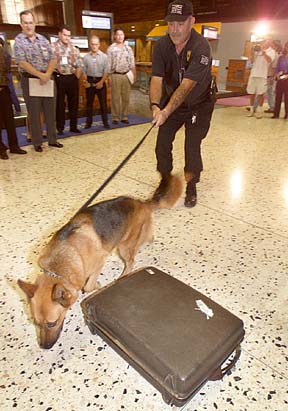


![]()
Talk Story
Heightened airport security
is losing its rough edgesSIX months after the Sept. 11 terrorist attacks, a weekend trip to Kauai with my cousin, Terry -- visiting from Maine with his wife, Hope -- provided my wife and me an opportunity to observe firsthand how air travel in Hawaii has changed.
The lines at Honolulu International weren't any shorter, especially those snaking through the lobbies to the interisland ticket counters. These now process all passengers. Avoiding the line by checking in at the gate or curbside is a thing of the past.
Also passé is finding parking in the interisland terminal on the weekends. We arrived before 8 a.m., but the parking garage fills up early. I dropped off Terry and our wives to get a place in line and headed to the main parking garage, a 10-minute walk away.

|
According to The Wall Street Journal, because of heightened security there were 1,361 flight delays and 587 planes stopped and evacuated between Oct. 30 and Dec. 31. In addition, there were 35 U.S. airport evacuations between Oct. 30 and Feb. 4.That wouldn't include the recent evacuation at Lihue, our destination. On Friday, March 1, a private security guard left his post to use the bathroom and a Federal Aviation Administration security specialist found the door to a secured area unmanned.
The Lihue airport was reopened in 40 minutes and a single Hawaiian Airlines plane was held on the runway. By comparison, last month a security worker in Louisville, Ky., fell asleep on the job and more than 1,000 passengers had to be rescreened, delaying 25 flights.
The Federal Transportation Security Administration plans to hire at least 30,000 security screeners by next November. Meanwhile, private companies are still doing the work. Despite the many well-publicized lapses, security screening has sped up perceptibly compared to what we experienced on a Thanksgiving trip to Hilo and a Christmas trek to the mainland.
After six months on the job, the rifle-toting National Guardsmen patrolling the terminal might seem less imposing and be a bit bored, but the security screeners are now visibly more alert, quick and efficient.
They provide plenty of plastic tubs to send coins, keys, cell phones and cameras through the scanners, while manual searches with metal-detector wands are handled quickly and expertly -- even, in some cases, cheerfully.
Echoing this new professionalism, passengers are mostly better prepared. We're packing lighter, using clear plastic bags for the odds and ends in our carry-on baggage, and leaving non-essential laptops, guitars and golf clubs at home. There's now more space in the overhead bins, too.
My wife and I also found transparent plastic photo ID holders and lanyards issued by one of the airlines handy. Passengers can expect at least three identity checks -- at the ticket counter and security gate and when boarding the plane.
We discovered that the names printed on ID cards and boarding pass must match. Hope kept her own surname after marriage and her driver's license reads "Hope Hilton." However, we made reservations for "Terry and Hope Flanagan." An alert ticket agent spotted the problem and made the change before it held us up at the gate.
Random metal-detector and hand-baggage searches at the gate during boarding seem speedier than before, perhaps because I wasn't singled out personally for extra attention on this trip. Security personnel have become more adept, while passengers also appear to be more relaxed and accustomed to the inconvenience.
The nation's 400-plus airports all won't be equipped with sophisticated explosive-detection machines until the end of the year. So far, only about 50 airports have them. The only machines certified by the feds weigh in at more than a ton apiece and carry price tags exceeding $1 million each.
Accordingly, Honolulu International is still using a perky little beagle to sniff for explosive contraband at the carousels and elsewhere. While he might be unsophisticated, he's a welcome bit of entertainment for passengers waiting for their bags.
Sept. 11 changed the way we travel and added billions to the cost of keeping it safe. Still, watching the busy little bomb dog work the room, I decided that we've come a long way.
Security is still imperfect, but it's tighter and we're not just going through the motions anymore. Doing it better is key to getting Americans flying again, and that's important for Hawaii.
John Flanagan is the Star-Bulletin's contributing editor.
He can be reached at: jflanagan@starbulletin.com.